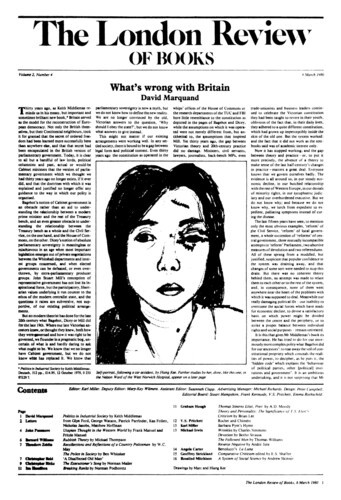For forty years, in person and in writing, Raymond Mortimer was an ornament of English literary journalism. He was at his best, I think, in the querulous Thirties and Forties when he was Literary Editor of the New Statesman. In the preface to his only book, a collection of essays with the typically Edwardian title of Channel Packet, he described himself ‘without humility’ as a journalist and not an author. But, he said, a ‘succession of hundred-yard sprints demands no less effort than a cross-country race.’
In saying he was an ornament I mean that he had his exotic Strachey-like moments, and that only he, in an erudite article on Victorian bishops, could describe them as ‘girt in the billowing majesty of rochet and chimère’, and find in the faces of the earlier ones the ‘pampered’ look of salmon. Yet his writing had also the cultivated address and idiosyncrasy of Bloomsbury’s conversational style. He was very much a Bloomsbury figure. He always said he wrote for a few friends; he appeared, especially when he was young, to be modish. Here he was deceptive. There was iron in him: he was an heir of the Utilitarians, an aggressive partisan of the liberal culture. He hated all tyrannies. I remember him saying that every writer on the paper ought to be obliged to read Mill on Liberty once a year. The langour of the drawling man of taste veiled a mind of stern moral principle. On the New Statesman he saw himself as a tutor, firm but beguiling, a tutor not only to young writers but to its readers.
The trained rush of words, and the racer’s stare in the eyes as he sprinted after his prejudices, made Raymond intimidating on first acquaintance. He always got his blow in first; he easily matched Crossman in this and made circles round Kingsley Martin, for whom he had real affection without having much in common with him. Raymond liked to dazzle, and did dazzle by immense reading in many languages: not only among the great masters, but the minor ones, not only in great imaginative works but in history, biography, archaeology, painting and sculpture. He read fast, exclaiming with pleasure or protest, and forgot no detail. He travelled thoroughly in Europe, in many parts of Asia and the Americas. He had studied all the pictures and monuments. He travelled for pleasure, but took enormous pains in getting the most out of his journeys intellectually. Weeks in the libraries prepared the hedonist for missing nothing. ‘Keeping up with Raymond’ often put his friends into a panic. A demanding intelligence? A fuss to work with? No, a stimulating education. I worked with him for years at Great Turnstile, hearing him scream at howlers and groan over syntax, watching him search dictionaries for the uncommon word, as he painfully typed his way forward, crossing out and typing again, and found him kind and easy. Rochet and chimère did not glide into his mind; he dug, inquired and pestered until he found them. He was a very affectionate and generous man, very thoughtful of others. Neither exasperation nor his very decided views about manners exhausted the tolerance of the moralist. The sybarite – for there was a distinct touch of that in his nature, and Virginia Woolf twitted him for dining with duchesses – might think our lives peculiar, but he could not resist the variety of human nature.
Raymond was undoubtedly at his best when writing for the New Statesman, because he liked swimming against the current. He often quarrelled with its politics. The fellow-travelling of the Thirties tried him and so did Cambridge puritanism – more tutoring was called for. Why, with his gifts, did he never go in for the long cross-country run and turn author? His deep knowledge of the great Victorians and his moral curiosity, his feeling for human character, would have equipped him, as excellent essays on Browning and Macaulay showed, for biography. He could have settled down to a book on Persia, where he had once stayed for a long time. There were rumours that he fancied a book on suicide, a subject that fascinated him. He was brought up a good deal in France and wrote French almost as well as he wrote English – one of the few Francophiles who never got an accent or a gender wrong. Why, after his essays on Mallarmé, Balzac or Proust, no book? Perhaps he delighted too much in discriminating. The sheer, restless pleasure in knowing more may have been too absorbing. Perhaps Bloomsbury’s cult of conversation and friends was too absorbing. I suspect him, too, of perfectionism: he was overcome by his admiration for the talents of others and, having means, he felt a guilt in earning money. Perhaps early French influences had made him too sensible in parcelling the needs of the good and feeling life. Yet he was extravagantly, pedantically and rather sweetly himself, and it is that drawling and petulant extravagance I shall miss.
Send Letters To:
The Editor
London Review of Books,
28 Little Russell Street
London, WC1A 2HN
letters@lrb.co.uk
Please include name, address, and a telephone number.

